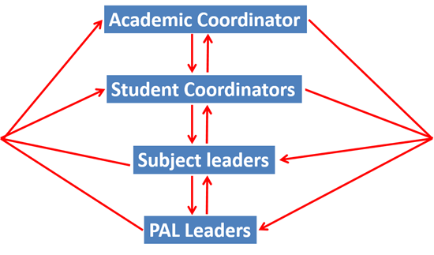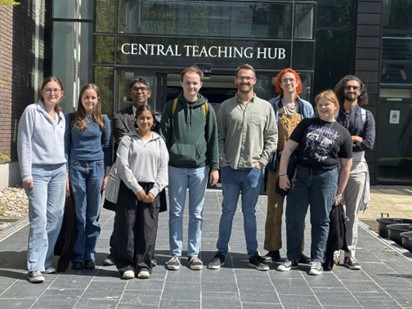Peer-Assisted Learning
A collaborative initiative that connects first year students with experienced peers who can guide and support their academic journey.
The Peer Assisted Learning (PAL) scheme helps students in the Department of Chemistry to bridge the gap between school and university and adapt to university life and a different educational environment. PAL sessions are regularly timetabled and offer an environment for lower year students to work in a highly informal, non-threatening environment. The PAL scheme is overseen by a few members of staff, but the sessions are facilitated by capable higher year students known as PAL leaders.
Peer-assisted learning is:
- A student-driven scheme in which PAL leaders aid the development and understanding of a variety of subject areas. PAL leaders have been trained to organise and facilitate weekly study support sessions
- Structured to give students a chance to: adjust quickly to university life; improve their study habits and enhance their understanding of the subject through group discussions
- Beneficial to the university experience for both participants and PAL leaders.
Peer assisted learning is not:
- There to reduce student-lecturer contact. PAL sessions are optional additional support and you must still attend all lectures, workshops and labs to truly benefit from your course
- Targeted at “weak” or “underachieving” students. It's available for anyone who needs help
- Teaching by senior students The PAL leaders are only there to advise and provide guidance.
PAL structure
Our experience shows that students value the informality of PAL but appreciate the organised sessions which are structured for the convenience of participants.
The following figure shows the PAL structure and the communication links between coordinators and leaders to keep PAL sustained over time.

Leaders and coordinators take on different responsibilities:
- Subject Leaders plan the sessions and prepare the relevant materials.
- PAL Leaders use these materials to facilitate discussions around selected topics in small groups of students.
- The Academic Coordinator and Student Coordinators supervise the overall organisation of PAL and the communication between leaders and participants.
Read more as part of a university case study driven by the department
Please see some case studies below from some of our current and former PAL leaders
Harry Palmer
MChem Chemistry Student
"Becoming a PAL leader helped me to grow as both a chemist and a communicator. Supporting students in lower years gave me the chance to refresh my knowledge of key topics while developing confidence speaking to groups of people and one-on-one. Having had this opportunity will inevitably help me going forward into my career as a chemist where the ability to communicate science effectively will be paramount."

Dr Gina Washbourn
Former MChem Medicinal Chemistry and Pharmacology
Current Senior Lecturer in Chemistry, Chemistry Admissions Tutor
“PAL was not an experience I was initially keen to be involved in. I lacked confidence in my knowledge and my ability to explain concepts to others. With a little encouragement, I became a PAL leader for Organic. The first thing I noticed improved was my confidence speaking to other people, including students in my year and above, staff and of course 1st year students. I found that I really enjoyed helping to support and welcome 1st year students into the department during these sessions.
I also found the sessions very personally beneficial. Being able to recap content and figure out new ways of explaining concepts, help me understand everything better and I became a better chemist because of it. I also was lucky enough to be a PAL coordinator in my 4th year. Having the opportunity to lead other students was brilliant! When I went for interviews, it was often my PAL experience they were more interested in than the academic stuff!
PAL inspired me to take my teaching further. I went on to be a Demonstrator, work as a sessional tutor in Liverpool International College. This helped me then to secure my posts Lecturing in Oceanography and Chemistry and was hugely beneficial during my PGCE Teacher training). I can confidently say I am in my lecturing role now thanks to my PAL experience.
I would actively encourage all students to get involved in PAL. Whether you think you are the best student, or a student that struggles with the subject, your ability to support someone else, could be the thing that helps to improve you!”
